|
|
|
Sort Order |
|
|
|
Items / Page
|
|
|
|
|
|
|
| Srl | Item |
| 1 |
ID:
075123
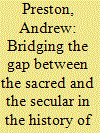

|
|
|
| 2 |
ID:
097063


|
|
|
| 3 |
ID:
189488
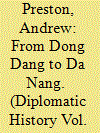

|
|
|
|
|
| Summary/Abstract |
Where else to begin a SHAFR presidential address than with Henry Luce and the “American Century”? If we were gathered together in person, in Arlington, I imagine I’d be hearing audible groans right now, maybe even a few gasps. Henry Luce, that old chestnut … again? Even though you’re all muted, I can still just about hear someone muttering under their breath, “Really?”
|
|
|
|
|
|
|
|
|
|
|
|
|
|
|
|
| 4 |
ID:
132025
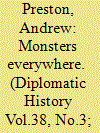

|
|
|
|
|
| Publication |
2014.
|
| Summary/Abstract |
This article, based on the 2014 Stuart L. Bernath Lecture, traces the emergence of "national security" as a foreign policy doctrine that came to define the safety of the United States in extremely broad terms, both geographically and ideologically. Doing so reveals that "national security" has its own history. The concept was invented by fusing long-standing, traditional concerns about U.S. territorial sovereignty with a newer, thoroughly revolutionary desire to protect and promote America's core values on a global scale. Franklin D. Roosevelt's legacy looms large in the history of American foreign relations, but it was his use of fear to invent the modern doctrine of national security that is possibly its most consequential aspect. After a couple of false starts, a fusion of geographical and ideological security took place during the world crisis of the late 1930s and the world war that followed. The results have defined U.S. foreign policy ever since.
|
|
|
|
|
|
|
|
|
|
|
|
|
|
|
|
| 5 |
ID:
180337
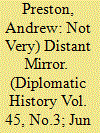

|
|
|
|
|
| Summary/Abstract |
Until recently, when teaching international history, I used to debate my students whether things really are worse than they had ever been. It’s been a common refrain for at least a decade, and not just among undergraduates. War, terrorism, sectarian violence, economic volatility—all have been portrayed as either the worst crisis we’ve seen, or that the collective impact of these crises has put the world in an unprecedented and ever-deteriorating emergency; I’ve been skeptical. When my students would bring up the war in Syria, for example, I’d point out that the wars in Korea in the 1950s and Indochina in the 1960s and 70s were much worse: more dead, more wounded, more environmental damage, and so on. When they would point to U.S. tensions with China or Russia, I’d point out that Cold War tensions were worse, that they led to levels of violence we couldn’t fathom today, and that the truly existential risk from decades of nuclear deterrence and mutual assured destruction is not nearly as serious as it had been between the 1950s and early 1980s.
|
|
|
|
|
|
|
|
|
|
|
|
|
|
|
|
| 6 |
ID:
134199
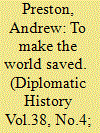

|
|
|
|
|
| Publication |
2014.
|
| Summary/Abstract |
Americans interpreted World War I in highly spiritual and theological terms. To them, the war would make the world saved and redeemed. Conversely, the war had profound effects on American religion, for Protestants, Catholics, and Jews alike.
|
|
|
|
|
|
|
|
|
|
|
|
|
|
|
|
|
|
|
|
|